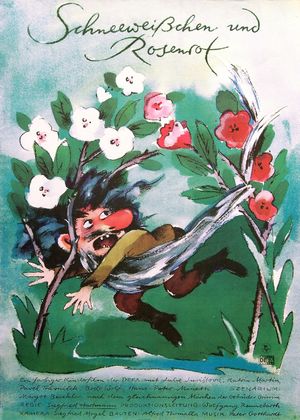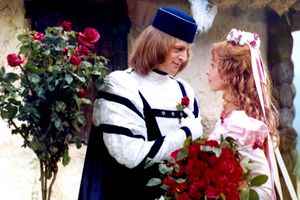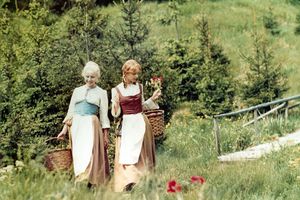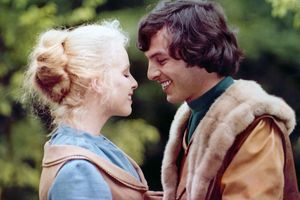Schneeweißchen und Rosenrot
Director: Siegfried Hartmann, 70 Min., Color, Feature Film
Deutsche Demokratische Republik (DDR)
DEFA-Studio für Spielfilme, 1978
- Film/Video Format
- 35 mm
- Length in m
- 1920
- Other Title
- Schneeweisschen und Rosenrot
- English Title
- Snow White And Rose Red
- Premiere Date
- Release Date (for Cinema)
- Literary Source
- Gebrüder Grimm: "Schneeweißchen und Rosenrot", Märchen

(Dir.: Siegfried Hartmann, 1978) Graphic Design: Dagmar Kunze
Short Summary (English)
Ever since the mountain goblin "Moldy Beard" terrorized the mining valley with his evil deeds, people have been abandoning the area. It is only Snow White, Rose Red and their mother who still live on the edge of the forest. One day two princes, disguised as hunters, suddenly find themselves in front of the family's little wooden shack. The girls tell them all about the shut down mine tunnels.
As the young men try to fathom the mystery of the mines, they are transformed by the mountain goblin into a bear and a falcon. All through the severe winter; the unsuspecting girls tend to the wounded animals and keep up their search for the disappeared princes. On this quest, they also encounter "Moldy Beard" whom they rescue three times from a tight spot. To do this, they have to cut his magical beard, which is repaid with ingratitude.
Finally, he sets a trap for them and tries to kill them. In the nick of time, the bear and the falcon manage to save Snow White and Rose Red. In view of such a show of genuine affection, the mountain goblin has to give up and is into stone. The four celebrate their wedding and the mine is returned to the miners.
Source: Progress Film-Verleih

(Dir.: Siegfried Hartmann, 1978) Photography: Jürgen Hoeftmann, Herbert Kroiss

(Dir.: Siegfried Hartmann, 1978) Photography: Jürgen Hoeftmann, Herbert Kroiss
Film Crew
- Director
-
- Siegfried Hartmann
- Script
-
- Siegfried Hartmann
- Scenario
-
- Margot Beichler
- Camera
-
- Siegfried Mogel
- Film Editing
-
- Renate Bade
- Cast
-
- Julie Jurištová (Schneeweißchen)
- Katrin Martin (Rosenrot)
- Pavel Trávníček (Michael)
- Bodo Wolf (Andreas)
- Hans-Peter Minetti (Berggeist)
- Johannes Wieke (Matthias)
- Annemone Haase (Mutter)
- Hanjo Mende (Klaus)
- Pedro Hebenstreit (Bär)
- Helmut Schreiber (Bertram)
- Erich Löwel (Dietmar)
- Erik S. Klein (König)
- Bertl Haller (Bäuerin)
- Arnim Mühlstädt (Bäcker)
- Willy Schmitz (Töpfer)
- Karl-Heinz Scherf (Böttcher)
- Hannes Stelzer (Bauchladenverkäufer)
- Kurt Götz (Jäger)
- Frank Heidenreich (Jäger)
- Wolfgang Jaster (Zwerg)
- Assistant Director
-
- Barbara Häselbarth
- Assistant Camera
-
- Dietrich Pohl
- Jürgen (auch: Hans-Jürgen) Hoeftmann
- Production Design
-
- Alfred Thomalla
- Script Editing
-
- Willi Brückner
- Music
-
- Peter Gotthardt
- Sound
-
- Peter Foerster
- Helga Kadenbach
- Costume Design
-
- Dorit Gründel
- Make-Up
-
- Britta Kersten
- Klaus Friedrich
- Heinz Wolter
- Props
-
- Werner Zettler
- Dietmar Kämpfe
- Production Management
-
- Wolfgang Rennebarth
- Unit Production Management
-
- Lutz Wittcke
- Michael Flechtner
- DEFA Photography
-
- Herbert Kroiss
- Jürgen (auch: Hans-Jürgen) Hoeftmann
- Dubbing (Dubbing Actor)
-
- Simone von Zglinicki (Schneeweißchen)
- Peter Reusse (Michael)
Short Summary (German)
Schneeweißchen und Rosenrot wohnen am Rande eines Waldes, in dessen Innern der Berggeist Schimmelbart sein Unwesen treibt, weil der den Reichtum einer Edelsteinmine für sich allein haben will. Die Mädchen berichten zwei als Jäger verkleideten Prinzen davon. Doch als die beiden jungen Männer das Geheimnis der Mine ergründen wollen, werden sie von Schimmelbart in Tiere verwandelt. Während des harten Winters versorgen die ahnungslosen Mädchen die Tiere mit Futter und ziehen sich damit den Zorn Schimmelbarts zu. Schließlich aber besiegen sie ihn, die Prinzen werden erlöst, die vier feiern Hochzeit, und die Bergleute bekommen ihre Mine zurück.
(Quelle: Das zweite Leben der Filmstadt Babelsberg. DEFA-Spielfilme 1946-1992)
Short Summary (Other Languages)
Biancarosa e Rosarossa vivono ai margini di un bosco in cui imperversa Schimmelbart, lo spirito della montagna, che vuole tutte le ricchezze della miniera di pietre preziose. Un giorno le ragazze incontrano due principi travestiti da cacciatori, determinati a sciogliere l’incantesimo della miniera. Schimmelbart, infastidito, li tramuta in animali, che le ragazze ignare sfamano per tutto l'inverno. Uniti, i quattro riescono a sconfiggere lo spirito maligno della montagna. I principi, liberati dall'incantesimo, sposano le ragazze e i minatori ottengono la loro miniera. (Italienisch)



